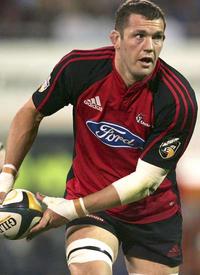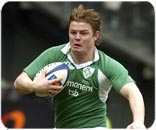The All Blacks completed a 2-0 series win over Ireland with a 27-17 win over Ireland in Auckland on Saturday, but it was an uneasy win in which Ireland had the home team lost for ideas for much of the second half.
In the end it was the weather which stumped the visitors as much as anything, a non-stop hose of rain which prevented the Irish from running the ball as much as they would have liked.
But there was no doubting the tactical superiority of the visitors for long periods of the match, especially the third quarter, and Graham Henry will face questions over his team he has not faced for a long time in this performance's aftermath.
It was a stirring match with lots of credit to both determined teams, and in the end it hinged on a mistake or two as the brave Irish came back, Phoenix-like but from the flood rather than from the flames.
Yet despite their efforts, they must still wait for that elusive first win over the All Blacks.
The rain fell straight down out of the heavens at Eden Park in Auckland. After a couple of unstaring anthems which some of the players sang tentatively, Carl Hayman, looking like a cross between Tarzan and John the Baptist, led his side in the exaggerated aggression of the haka, which is now less intimidating than the players try to make it, and finally the game was on.
The match was far more stirring than the preliminaries. It started in funny fashion with the All Blacks kicking straight down to Geordan Murphy in midfield, giving the Irish fullback a busy start to the match.
Two early penalties gave O'Gara a shot at goal - a long shot which fell short. The first activity which looked like producing a try came from a long, slithery kick by Aaron Mauger, whose tactical kicking in the match was brilliant. Gordon D'Arcy saved bravely and the intent Irish gout out of trouble, but not for long.
Chris Jack caught the ball in the line-out that followed Peter Stringer's clearing kick, and the All Blacks trudged up in a maul. Troy Flavell charged and was minisculely short. Back the ball came and chunky Byron Kelleher burrowed under big John Hayes to score a try which McAlister converted. 7-0 after six minutes.
The first scrum was significant. In it New Zealand got the shove-on on their own ball. Throughout the match they outscoring the Irish, once winning the ball against the head with a wheel.
The line-outs suffered from congestion but here things went better for New Zealand than they had in Hamilton. They lost four of nineteen throws as they used five jumpers. The Irish lost three of eighteen throws.
The Irish threatened when D'Arcy burst past McAlister and sent Ireland attacking down the left. O'Gara opted for a diagonal kick towards Andrew Trimble on the right but an opportunity was wasted.
After a turn-over, Kelleher, who was brilliant in the wet, broke and in fact could have scored on the left but sought to pass instead and was caught. Still, a penalty against Neil Best and Denis Leamy for being off-side made the score 10-0 after 23 minutes.
Mauger's boot set up position for the second try. He grubbered the ball down the right close to touch and, under pressure from Doug Howlett, Murphy was forced to fly-kick into touch. Rodney So'oialo caught the ball in the subsequent line-out and the All Blacks mauled. Jack plunged for the line but short of the line dropped the ball a few centimetres above the ground. Clarke Dermody picked up the ball behind Jack and plunged over for the try.
The Irish disputed the try, claiming that Jack had knocked it on. The ball appeared not to have gone forward when he dropped in which case there was no problem, but it is likely to be a talking point and important in the context of the unfolding game. This put Ireland 17-0 down after 28 minutes and one may have expected cracks to open, but instead the Irish fought back with all the composure of great professionals.
Just two minutes later they attacked, Dermody was penalised for diving and Ireland tapped. Big, ardent Paul O'Connell was knocked to ground, but not held. Several All Blacks were standing around him but none tackled him and the big man rose up and galloped through the standing New Zealanders and over and round for a try. 17-7.
Shortly after that Leamy was penalised for the wrongful use of his hands at a tackle/ruck and McAlister made it 20-7, but still the Irish refused to be walked over.
They made a penalty into a five-metre line-out and threw deep to Best. The All Blacks tipped Best in the air and again the Irish made a five-metre line-out. This time they mauled and when the maul fell apart hooker Jerry Flannery was there to plunge over for a try which O'Gara converted.
New Zealand kicked off to their left, straight to Brian O'Driscoll, which was a silly thing to do. The great centre sped down the right touch-line but, devoid of support, was forced to kick ahead and the All Blacks ran the ball out for half-time. 20-14 at the break, which was far closer than the opening exchanges had suggested it would be.
The breeze freshened and was behind the All Blacks in the second half but McAlister was short with a penalty attempt.
The All Blacks looked good going left when Howlett came in off his wing and Muliaina came in from fullback to make an overlap for Joe Rokocoko but the big wing, lacking the confidence of the past, was stopped.
Instead the Irish scored. O'Driscoll beat three men in a metre of space and Flavell grabbed at his throat to give Ireland a penalty and make the score a competitive 20-17.
This was a period of good pressure for Ireland. O'Gara missed a drop goal attempt and then found Anthony Horgan with a diagonal kick but Muliaina tackled the tall wing into touch.
Many changes were made from then on as the coaches sought to find a game-breaking moment. One of those to come on with five minutes to go was New Zealander Isaac Boss, less wildly hirsute than when he played for the Chiefs and Waikato. He came on for Peter Stringer. David Hill also came on for his first Test cap for New Zealand.
After O'Gara had knocked on an unpressured pass in midfield, New Zealand got back into the game with a series of pick-and-goes but the Irish defence was brave and determined. They had a crucial five-metre scrum. It was reset twice as Horan went down and then off the third scrum So'oialo picked up and drove forward. Back came the ball and Kelleher gave to McAlister. The muscular young flyhalf burst through slender veteran O'Gara and scored under the posts in O'Driscoll's grasp. He converted, and the game was done.
In those last nine minutes Ireland still had the better of play, but it was not productive any more.





